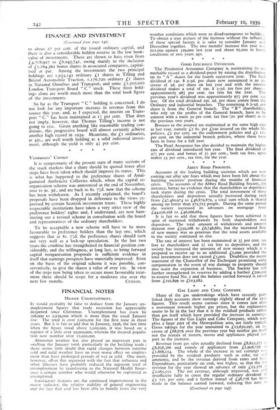FINANCIAL NOTES
HIGHER UNEMPLOYMENT.
IT would probably be false to deduce from the January un- employment figures that trade recession has appreciably deepened since Christmas. Unemployment has risen by 208,000 to 2,039,000 which is more than the usual January rise. The total is over 2,000,000 for the first time in three years. But it is fair to add that in January, 1936, the last time when the figure stood above 2,000,000, it was based on a register of a little over ro,000,000, whereas the insured popula- tion now number over 12,000,000.
Abnormal weather has also played an important part in swelling the January total, particularly in the building trade ; there seems little doubt that rapid changes between extreme cold and mild weather have an even worse effect on employ- ment than have prolonged periods of wet or cold. One must, however, offset this argument with the fact that influenza and other illnesses have probably reduced the apparent total of unemployment by transferring to the National Health Insur- ance a certain number who would otherwise be registered as unemployed.
Satisfactory features are the continued improvement in the motor industry, the relative stability of general engineering and the fact that coal has been able to benefit from the very
weather conditions which were so disadvantageous to building. To obtain a true picture of the increase without the influerk of these special factors it is safer to consider January and December together. The two months' increase this year 211,000 against 329,000 last year and about 65,000 in boon conditions of two years ago.














































 Previous page
Previous page